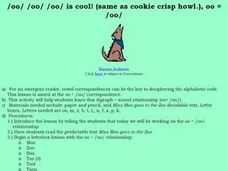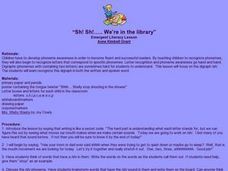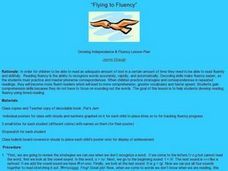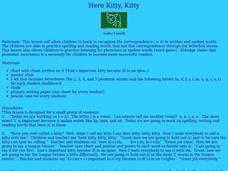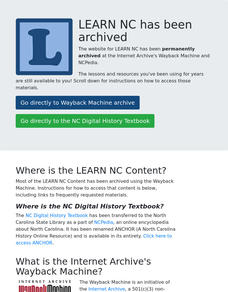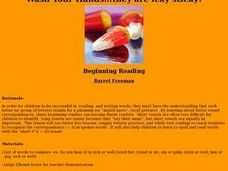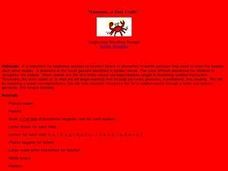Curated OER
What Do Seals Eat?
Students recognize the ea=/E/ correspondence in spoken and written words. They participate in a group letterbox lesson plan. In groups of two, they practice reading with each other, taking turns reading one page at a time, identifying...
Curated OER
Oh My
Learners are introduced to the vowel-consonant-e patter that changes short vowel sounds into long vowel sounds. They distinguish between the short vowel sound for o and the long vowel sound for o. Students practice reading and spelling...
Curated OER
Hi, My Name is A
Students distinguish between short vowel a and long vowel a. They are introduced to the vowel-consonant-e pattern that changes short vowel sounds into long vowel sounds. They practice decoding pseudo words with the vowel-consonant-e...
Curated OER
Cookie Crisp Howl
Students are introduced to the vowel pattern that produces the /oo/ sound in words. Through matching, listening, and spelling activities, students recognize the phoneme /oo/ and it's placement in words. They write a message using words...
Curated OER
Wade Swayed At the Masquerade
Students practice reading words with vowel patterns that change the sound of the vowel. After reviewing the short vowel sound /a/, they are introduced to the vowel-consonant-e pattern that changes the short vowel sound into a long vowel...
Curated OER
The Squeaky Door
Young readers distinguish between the sounds for short vowel e and long vowel e. They are introduced to the vowel patterns that comprise long vowel sounds, with emphasis on /ea/. They practice reading and spelling a variety of words that...
Curated OER
I Ate Grape Cake
Students distinguish between the sounds for short vowel a and long vowel a. They are introduced to the vowel patterns that comprise long vowel sounds, with a particular emphasis on vowel-consonant-e pattern. They practice reading and...
Curated OER
Sh! Sh! We're in the Library
Students focus on the diagraph of sh. They recognize this in both the written and spoken word. To introduce this lesson, the teacher asks if anyone's mom or dad has told them shhhh, when they were trying to get them to quiet down. ...
Curated OER
I Scream for Ice Cream!
Students determine that correspondences appear differently in different words. They discover the difference between long and short vowels and that these correspondences are spelled and pronounced differently. They review the i=/i/ and ...
Curated OER
Short a and short i
Students participate in a lesson plan used in order to strengthen reading comprehension skills. They use spelling lists in order to sort them to the corresponding studied sounds. Vocabulary is used and students read them in context.
Curated OER
"Flying to Fluency"
Young scholars become fluent readers by decoding words and practicing mastery of phoneme correspondences. They also practice repeated readings of texts along with timed readings of the book, "Pat's Jam." Each student interacts with a...
Curated OER
Here Kitty, Kitty
Learners recognize the short vowel i in written and spoken language. Through matching activities, they discriminate the short vowel /i/ from other vowel sounds. Students associate the phoneme with its letter representation and identify...
Curated OER
Rainbow Spelling (Kinesthetic Approach To Encoding)
Second graders demonstrate their encoding skills by spelling words using color coded paper, match correct letters with the colored paper to spell the words in standard form, and self correct any errors made in the spelling with colored...
Curated OER
Made You Mad
High schoolers explore the phoneme for the vowel-consonant-silent e grapheme. They recognize the silent "e" at the end of words and practice speaking them. Students say words, spell them, and say tongue twisters with the vowel...
Pennsylvania Department of Education
Writing with Beans
Students become familiar with the letters in a word by pasting beans on it. In this Bean writing lesson, students make words using navy beans. Students color or paint the beans.
Curated OER
History in Pictures
Sixth graders interpret diary entries, letters and read maps to better understand portions of history. They create an oral presentation demonstrating understanding of how cultural characteristics have been communicated through art,...
Curated OER
CVC Words
In this CVC words worksheet, learners write a set of 20 consonant, vowel, consonant words, all with short vowels in the middle. Students copy by tracing the word as it appears beneath its corresponding picture.
Curated OER
Wash Your Hands...they are icky sticky!
Students engage in an emergent literacy instructional activity that focuses on phonemic awareness and they practice corresponding the letter "i" to its long or short sound. This type of recognition has been found to be essential to...
Curated OER
Language Arts: Sound Recognition
First graders practice the short i sound by repeating tongue twisters. Later they write the letter i by using the analogy of drawing a straight line from the "fence" down to the "sidewalk" and putting a "basketball" above it. Other...
Curated OER
"Aaaaaaa...a Fast Crab! "
Students participate in an emergent literacy lesson that focuses on the skill of phonemic awareness. The phoneme chosen is the letter "a". They need to correlate the sound to the letter.
Curated OER
A Tisket-A-Tasket, Let?s Make a Flower Basket!!!
First graders practice blending words with the phonemes /i/ and /e/. Working with a specific groups of letters, 1st graders create words using the vowels i and e. they decode those words and read them repeatedly to increase fluency.
Curated OER
Tick Tock /t/
Learners review letter recognition for the letter /t/ and the sound of the letter /t/. They write an upper- and lower-case /t/ and recognize the sound of t as well as the letter when combined with other letters in the form of a word.
Curated OER
D says DUH! Duh?
Students identify the letter D, both upper and lower case and recognize and identify the letter d in various words and illustrations. They identify how the mouth moves with the letter D through various word pronunciations. Finally,...
Curated OER
The Icky Sticky Igloo
Students focus on the correspondence i=/i/. They explore the sound and spelling of /i/ and discover vowels are used to spell all words in our vocabulary, so therefore it is important for students to understand the phoneme and grapheme of...





